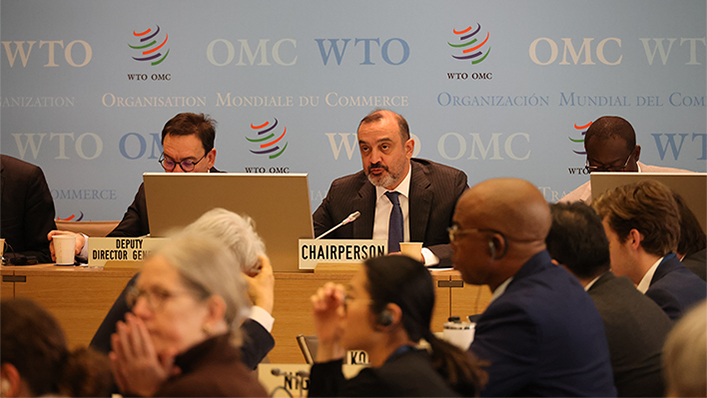
During the meeting, the chair invited members to focus on the way forward rather than on specific negotiating topics. The chair told members that, exceptionally, the meeting should be considered as addressing all topics, including those normally addressed in dedicated sessions.
“We will need to roll up our sleeves and get down to work,” Ambassador Acarsoy said.
Chair’s report notes good momentum
After conducting 37 bilateral consultations with members and group coordinators over the past two weeks, the chair expressed satisfaction with the positive momentum as negotiations resumed.
He reported a general readiness within the membership to say “no to no”, meaning to stand ready to engage with one another with an open mind and in a constructive spirit, without immediately dismissing topics of interest to other members. This constituted a good start that would allow members to be in a position to say “yes” in a year from now, he said.
Members emphasized the importance of addressing food security issues, particularly in light of current challenges, such as the war in Ukraine, the pandemic’s legacy and high food price inflation. However, the chair also stressed that members had different views on how various policy measures could influence food security. He also noted that some members thought an emergency outcome on food security at MC13 could focus on the specific needs of least developed countries and net food-importing developing countries.
The chair also noted that several members favoured addressing the environmental sustainability of agricultural trade in the negotiations, while others expressed concern that doing so could go beyond the purview of the farm talks and potentially create new trade barriers.
The importance of special and differential treatment for developing members was also stressed by many members, he added.
Members’ negotiating priorities had not changed significantly since before MC12, the chair said, with many emphasising the need to address as a priority domestic support, including for cotton and issues associated with developing country purchases of food at administered prices under their public stockholding programmes for food security purposes. Some members also highlighted other topics, including the importance of improving market access, establishing a “special safeguard mechanism” for developing countries to raise tariffs temporarily when import volumes surge or prices drop, addressing the impact of food export restrictions, and improving transparency across various agricultural trade topics, he said.
The chair also noted that some members called for other members to take a fresh approach to the negotiations.
Looking ahead, the chair encouraged members to build on the positive results achieved at MC12. He added that virtually all members expressed their readiness to step out of their comfort zones and make efforts to consider new ideas, which was a positive sign for the negotiations.
Discussions on way to MC13
Members welcomed the chair’s report and shared their views on the path to MC13. They reaffirmed their commitment to pushing forward with agricultural reform across all topics and highlighted the urgent need to improve food security.
Many members and negotiating groups presented their ideas on how to advance the negotiations, emphasizing the importance of ensuring an open, inclusive and transparent process as talks restart. Some members called for capital-based officials to be more closely involved to have more in-depth exchanges between members.
Next steps
“This process is, and will remain, member-driven,” said the chair. He pledged to do everything in his power to facilitate the talks and urged members to intensify their dialogue with one another, with a view to resolving differences and exploring the possibility of submitting future inputs and proposals.
“I will be guided in our process forward by the principles of respect, fairness, inclusiveness and transparency and will listen attentively to each and every one of you as I seek to build trust among you,” the chair emphasized.
He also announced plans to convene the next negotiations meeting during an “Agriculture Week” starting on 27 March. This should also include seminars delving deep into different negotiating topics, he said.
In conclusion, the chair encouraged members to build on the concrete outcomes from MC12.
“We will need to be ready to demonstrate that trade in food and farm goods can contribute to a sustainable, secure food future,” he told participants.
He also reminded them that ministers at MC12 had recognised the vital role trade plays in improving food security and nutrition and committed to take concrete steps to improve the functioning and long-term resilience of global markets for food and agriculture.
“It’s now our responsibility to turn these words into action,” Ambassador Acarsoy said.
Share
Reach us to explore global export and import deals